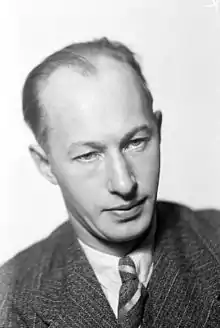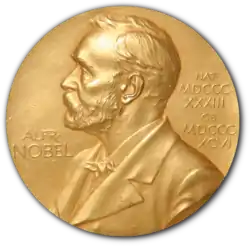Eyvind Johnson
Eyvind Johnson (29 July 1900 – 25 August 1976) was a Swedish novelist and short story writer. Regarded as the most groundbreaking novelist in modern Swedish literature[1] he became a member of the Swedish Academy in 1957 and shared the Nobel Prize in Literature with Harry Martinson in 1974 with the citation: for a narrative art, far-seeing in lands and ages, in the service of freedom.
Eyvind Johnson | |
|---|---|
 Eyvind Johnson | |
| Born | Olof Edvin Verner Jonsson 29 July 1900 near Boden, Norrbotten, Sweden |
| Died | 25 August 1976 (aged 76) Stockholm, Sweden |
| Nationality | Swedish |
| Period | 1924–1976 |
| Notable works |
|
| Notable awards | Nobel Prize in Literature 1974 (shared with Harry Martinson) |
| Spouses |
|
| Children |
|
| Website | |
| www | |
Biography
Johnson was born Olof Edvin Verner Jonsson in Svartbjörnsbyn village in Överluleå parish, near the town of Boden in Norrbotten. The small house where he was born is preserved and marked with a commemorative plaque.
Johnson left school at the age of thirteen and then held various jobs such as log driving and working at a saw mill and as a ticket-seller and projectionist in a cinema. In 1919 he left his hometown and moved to Stockholm where he began to publish articles in anarchist magazines like Brand. In Stockholm he became friends with other young proletarian writers and started the magazine Vår nutid. He travelled in Germany in the 1920s and lived in Saint-Leu-la-Foret, near Paris, France between 1927 and 1930 with his wife Aase Christoffersen (1900–1938). At this point he had published his first books. The first De fyra främlingarna, a collection of short stories, was published in 1924. His first major success as a writer was four autobiographical novels published between 1934 and 1937, published together as Romanen om Olof ("The Novel about Olof"), about a young man growing up in the northern parts of Sweden. It was later filmed as Here Is Your Life.
Johnson was strongly against fascism and nazism. During World War II he was editor of the magazine Håndslag and published Krilon, a trilogy of novels that in the form of an allegory deals with the events during the war.
In 1946 he published one of his most famous novels Return to Ithaca, based on the story of Odysseus as he returns to Ithaca after the Trojan war. Johnson married translator Cilla Johnson in 1940. He lived with his family in Switzerland 1947–1949 and then a year in England. Travels to Italy and France inspired him to write several well-received historical novels. In 1957 he was elected a member of the Swedish Academy.
His most noted works include Here's Your Life (1935), Return to Ithaca (1946) and The Days of His Grace (1960).
Controversy
The choice of Johnson and Harry Martinson as Nobel Prize winners in 1974 was controversial as both were on the Nobel panel themselves and Graham Greene, Vladimir Nabokov, Saul Bellow and Jorge Luis Borges were the favoured candidates that year.[2]
Bibliography
- De fyra främlingarna (short story collection, 1924)
- Timans och rättfärdigheten (novel, 1925)
- Stad i mörker (novel, 1927)
- Stad i ljus (novel, 1928)
- Minnas (novel, 1928)
- Kommentar till ett stjärnfall (novel, 1929)
- Avsked till Hamlet (novel, 1930)
- Natten är här (short story collection, 1932)
- Bobinack (novel, 1932)
- Regn i gryningen (novel, 1933)
- Nu var det 1914 (novel, 1934)
- Än en gång, kapten! (short story collection, 1934)
- Here's Your Life (Swedish: Här har du ditt liv!, novel, 1935)
- Se dig inte om! (novel, 1936)
- Slutspel i ungdomen (novel, 1937)
- Nattövning (novel, 1938)
- Den trygga världen (short story collection, 1940)
- Soldatens återkomst (novel, 1940)
- Grupp Krilon (novel, 1941)
- Krilons resa (novel, 1942)
- Krilon själv (novel, 1943)
- Sju liv (short story compilation, 1944)
- Return to Ithaca (Swedish: Strändernas svall, novel, 1946; drama, 1948)
- Pan mot Sparta (short story collection, 1946)
- Dagbok från Schweiz (1949)
- Drömmar om rosor och eld (novel, 1949)
- Lägg undan solen (novel, 1951)
- Romantisk berättelse (novel, 1953)
- Tidens gång (novel, 1955)
- Vinterresa i Norrbotten (1955)
- Molnen över Metapontion (novel, 1957)
- Vägar över Metaponto – en resedagbok (1959)
- The Days of His Grace (Swedish: Hans nådes tid, novel, 1960)
- Spår förbi Kolonos – en berättelse (1961)
- Livsdagen lång (novel, 1964)
- Stunder, vågor – anteckningar, berättelser (1965)
- Favel ensam (novel, 1968)
- Resa i hösten 1921 (1973)
- Några steg mot tystnaden (novel, 1973)
- Olibrius och gestalterna (youth short story collection, 1986)
- Herr Clerk vår mästare (original version of Minnas, novel, 1998)
References
- Svenska Akademien
- Raúl Fain Binda BBC Mundo (1 January 1970). "BBC Mundo – Noticias – Londres 2012: el cruel destino del atleta que llega cuarto". Bbc.co.uk. Retrieved 13 August 2012.
External links
| Wikiquote has quotations related to: Eyvind Johnson |
| Wikimedia Commons has media related to Eyvind Johnson. |
- Eyvind Johnson Society
- Eyvind Johnson on Nobelprize.org

| Cultural offices | ||
|---|---|---|
| Preceded by Nils Ahnlund |
Swedish Academy, Seat No.11 1957–1976 |
Succeeded by Ulf Linde |
